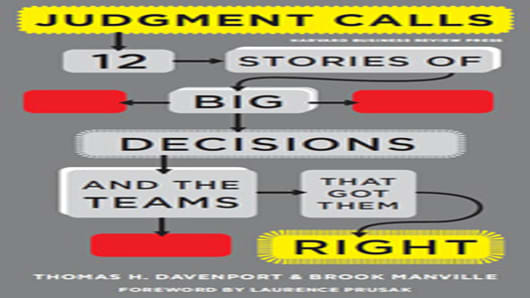GUEST AUTHOR BLOG: Your Brain on Decision-Making: Why Your Organization is Smarter than You by Brook Manville and Thomas H. Davenport co-authors of "Judgment Calls: Twelve Big Stories of Big Decisions and the Teams that Got Them Right."
Made another bad call?
Welcome to the club.
But don’t beat yourself up.
New cognitive research explains why we all so often make bad decisions: there are many mental traps we all fall into, and we’re even beginning to probe the brain itself to understand why the traps occur.
There’s plenty to be worried about: “ego bias” (over reliance on one’s own experience), “hindsight bias” (believing that past events will predict the future), “anchoring” (over-reliance on familiar but irrelevant information), or a “zero-risk bias” (over-emphasizing total risk avoidance and missing the opportunity for proportional risk reduction).
Take a cognitive scientist to dinner and you can have a long evening discussing more.
These kinds of traps come into focus looking back on famous blunders: mergers that destroyed massive shareholder value (AOL/Time Warner); misjudgment about letting a tottering institution fail (Lehman Brothers); a bad call on a new product release (New Coke); rating millions of credit default swaps as Triple A when they should have been rated…well, we know the rest of that story.
Even the creative geniuses we laud are capable of occasional poor judgment: the brilliance of Steve Jobs lives on in the iPhone and iPad, but he also hired John Sculley in the 1980s, that, by Jobs’ own admission “destroyed everything I spent 10 years working for, including me.”
There is no shortage of decision disasters to discuss, but in our new book—Judgment Calls: Twelve Big Stories of Big Decisions and the Teams that Got Them Right(Harvard Business Review Press, 2012)—we took a different tack. Instead of assessing failures, we dove into examples of important decisions that did deliver success. Then we looked for patterns of how successful leaders offset the inevitable bad stuff that happens when their own brains go into decision-making.
We looked at how NASA engineers and project leaders made a tough—but successful—call about going ahead with a space shuttle launch when there was some risk of a faulty system that could have created another Challenger disaster; how leaders of EMC the technology company found a way to reduce costs significantly in the 2008 downturn without losing essential talent through layoffs; how a mid-level manager at Vanguard spared the mutual fund company from a disastrous investment in toxic securities; how a small entrepreneurial beauty products company moved into riskier mainstream retail merchandising and created millions of dollars of wealth for its leaders; how a healthcare company improved patient care dramatically through better use of technology-delivered knowledge by doctors.
What was striking in our stories of the successful organizations was how often a few basic themes emerged. In the end we found four essential concepts—none dramatically surprising, but surprising in the consistency of their overall message: the individual leader who tries to make decisions on his/her own is at a huge disadvantage. The wise ones reframe decision-making—from their own prerogative to the work of the broader organization and its data and networks.
Making the big call heroically and alone is high risk; the solo brain on decision-making is asking for trouble. Successful enterprises don’t think about the single heroic leader; instead they build judgment into the organization overall. That begins, simply enough, with the leader who recognizes it must be more than him or her alone—and sets into motion an ego-less transformation to build a wider support system of knowledge, wisdom and experience all around. Secondly, the leader who recognizes the importance of organizational judgment frames any big decision not as a high-stakes transactional moment, with all the spotlights on him or herself, but rather as a participative problem-solving process of many. Big decisions are usually about several smaller decisions and laying those out, framing the issues, identifying alternatives, and engaging a diversity of smart people to address those— including those with hands-on experience and implementation responsibility.
The next theme reflects the new world of ever-sophisticated data analysis and technologically accessible information via networks—but it’s amazing how many organizations still don’t take advantage of those things. Organizations with great judgment integrate analytics and online knowledge—internally, via crowd-sourcing, over social networks and the like—into the heart of the problem-solving process. Finally great organizational judgment—and the leaders that promote it—create an operating culture that invites participation, and debate. Great leaders know that if their own brains on decision-making are prone to misfires, the surest way to hedge the risks is to make it easy for others to constantly challenge the “emerging point of view.” To avoid “groupthink, encourage “group dissent”—and learning to find better solutions amid the cacophony of competing but informed perspectives.
Jim Collins wrote that great leaders don’t look in the mirror, they look out the window. Our book argues that they look outside their doors to their own organizations when it comes to judgment. The most effective leader doesn’t make decisions alone, gazing narcissistically at the “fairest of them all.” Instead, great leaders look out to their organization, and even beyond—drawing together on the people, data, culture and processes that together make for real collective wisdom.
About the authors: Brook Manville is an independent consultant and the author of several publications on issues of strategy and organizational development. He previously served as Chief Learning Officer for Saba Software and the United Way of America, and before that was McKinsey & Company's first Director of Knowledge Management.
Thomas H. Davenport holds the President’s Chair in Information Technology and Management at Babson College, is a Visiting Professor at Harvard Business School (2012–2013) and a Senior Advisor to Deloitte Analytics. He is the author or coauthor of fourteen books, including Competing on Analytics.
Email me at bullishonbooks@cnbc.com — And follow me on Twitter @BullishonBooks


